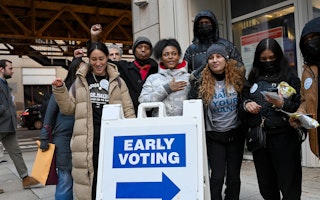New Law Will Help Prevent Law Enforcement Overreach in Schools
By Christopher Scott
A few years ago, I spoke to a group of suburban high school students from Colorado. I described my work to stop the criminalization of student misbehavior in schools. The mostly white students could not believe that mostly black, Latino, or students with disabilities are frequently suspended, expelled, or arrested for minor offenses like brushing their hair, talking, or having an unexcused absence from class.
A generation ago, it was teachers, guidance counselors, and principals who addressed students’ insolent behavior. Today, schools and law enforcement officers in schools are too quick to criminalize it. Inappropriate disciplinary tactics such as handcuffing kindergarteners, putting students in chokeholds, or shackling students with disabilities to desks need to end before more students are seriously hurt or killed.
Last month, many Americans saw firsthand what African American and Latino students have long experienced. At Spring Valley High School in South Carolina, a police officer slammed a 16-year-old African American girl onto the floor and violently dragged her simply because she did not listen to him. The video of the assault went viral, drawing much-needed attention to this problem.
Today, President Obama took a step toward mitigating the criminalization of school discipline by signing the Every Student Succeeds Act, a bipartisan measure that reauthorizes the 50-year-old Elementary and Secondary Education Act, which sets federal K–12 education policy and allocates federal education money to states.
The new measure replaces provisions of the 2001 No Child Left Behind law, which ushered in an era of measuring student progress with high-stakes testing. That law incentivized zero-tolerance discipline policies, including suspending, expelling, and referring students to juvenile courts and law enforcement as a way to improve overall school performance on standardized tests.
These provisions had a disproportionate impact on students of color. By removing students who did not test well, average test scores would remain higher and schools would be less likely to lose federal funding or be designated as “low performing.” Over time, suspension and expulsion rates shot up to record levels as an increasing number of law enforcement officers administered discipline in schools.
The new law will make several important changes in this area. First, it requires school districts to collect school discipline data, which will help shed light on racial disparities. The data will track the number of school-based arrests and referrals to the criminal justice system and the types of incidents for which students are disciplined. The data will show a correlation between harsh school discipline practices and a higher number of students shipped into the criminal justice system.
Second, states will have to identify schools with high rates of discipline. In those schools, school resources officers—police officers inside schools who too frequently rely on harsh law enforcement tactics to deal with children—would get additional training and professional development. Schools could then use federal funds to pay for that additional training.
But the new law would give states more discretion in defining and enforcing their own accountability measures—without corresponding mechanisms for either federal or community oversight. Without additional input from the communities they serve, schools run the risk of failing to protect the rights and interests of students disadvantaged by discrimination. Open Society grantees have seized upon this moment as a call to action for stakeholders to help ensure that the Elementary and Secondary Education Act fulfills its original promise.
For nearly a decade, the Open Society Foundations and Open Society Policy Center have worked to address the racism and injustices embedded in school policies that rely on law enforcement to mete out discipline. In 2010, we supported the Obama administration’s Supportive School Discipline Initiative [PDF], an effort by the Departments of Justice and Education to examine school discipline practices. Recognizing the problems resulting from too many police officers in too many classrooms, the Obama administration directed more spending to pay for more counselors and mental health professionals.
More recently, the Obama administration released federal guidance for schools on how to manage school discipline, convened state school superintendents identify ways to rethink school discipline, and developed a toolkit and planning guide for schools to address the root causes of racial disparities in school discipline.
The new law is a step forward in addressing inequities and injustices, but it would not necessarily prevent another event like we saw in South Carolina, or stop overly aggressive tactics to discipline students. More needs to be done.
Congress could take steps to ensure that minority students are not disciplined any more or less than white students. The Department of Education should study whether school resources officers actually create safe, healthy, and positive school climates. If that’s not the case, Congress should put discipline and education back in the hands of teachers, counselors, and parents.
Christopher Scott is senior program manager, cities, with With Open Society–U.S.


